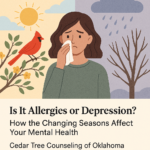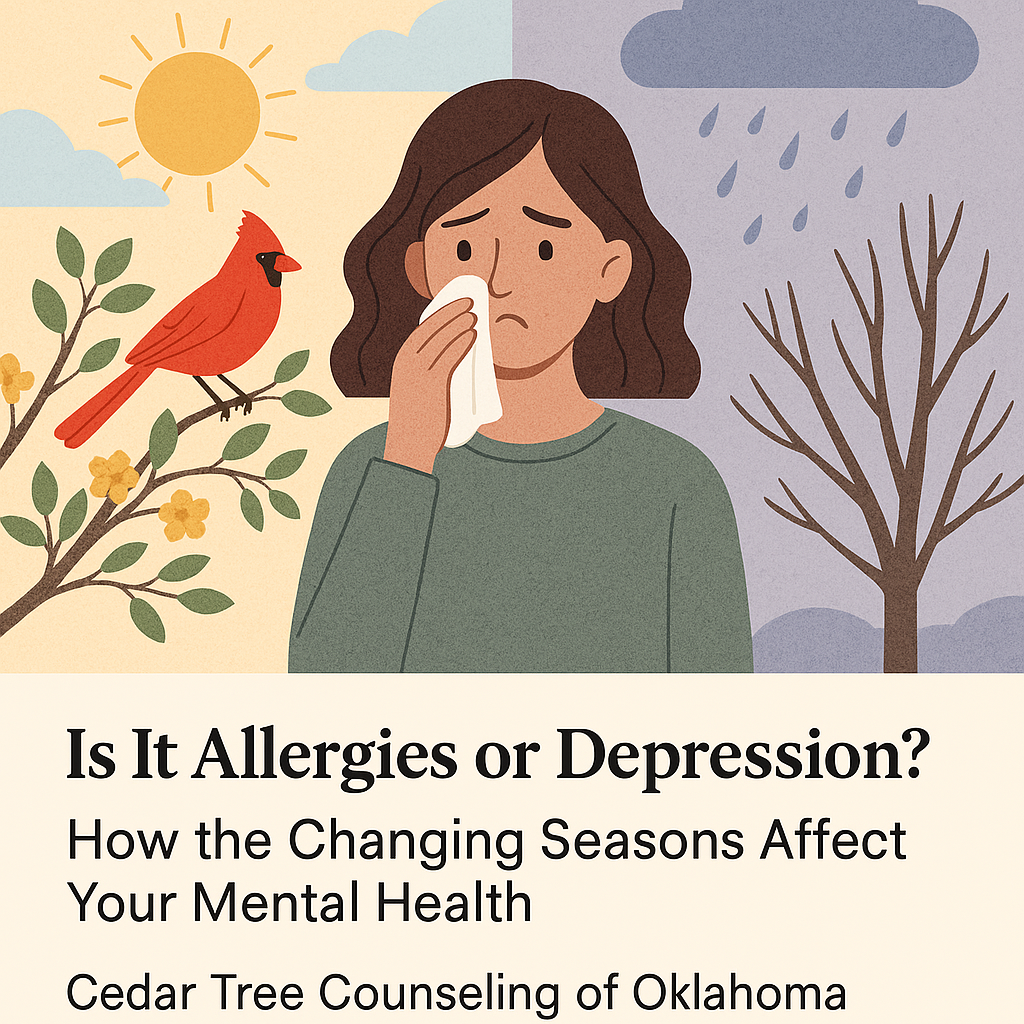
Is It Allergies or Depression? How the Changing Seasons Affect Your Mental Health
By Cedar Tree Counseling of Oklahoma
As the seasons change and spring begins to bloom, many people start to notice shifts—not just in the weather, but in how they feel emotionally and physically. You might find yourself feeling more tired, less motivated, or even a little down. But how do you know if you’re experiencing seasonal allergies, seasonal affective disorder (SAD), or something else entirely?
Let’s break it down.
Allergies vs. Depression: What’s the Difference?
Spring allergies are incredibly common in Oklahoma. As pollen counts rise, symptoms like fatigue, brain fog, headaches, and irritability often set in. But here’s the tricky part: many of those symptoms overlap with signs of depression.
Common Allergy Symptoms:
-
Sneezing, nasal congestion, runny nose
-
Itchy eyes or throat
-
Headaches
-
Fatigue or poor sleep quality
Common Symptoms of Depression:
-
Persistent sadness or hopelessness
-
Fatigue or low energy
-
Loss of interest in activities
-
Trouble concentrating
-
Changes in appetite or sleep
If you’ve ruled out the sniffles and still feel emotionally heavy, it could be more than allergies.
The Mental Health Side of Seasonal Shifts
Spring brings more daylight, warmer weather, and budding trees—but it also brings disruption. The transition between seasons can be jarring for your body and your mind. For some, spring is a time of renewal; for others, it can heighten anxiety or even bring about depressive symptoms.
Why?
-
The increase in daylight can affect melatonin and serotonin levels, impacting mood and sleep.
-
Social pressure to “feel better” in spring may clash with your internal state.
-
Seasonal Affective Disorder (SAD), often associated with winter, can also occur in spring.
When to Seek Support
If you’re feeling persistently low, disconnected, or overwhelmed, it’s worth checking in with a mental health professional. At Cedar Tree Counseling of Oklahoma, we offer a safe and supportive space to explore your feelings—whether you’re navigating seasonal transitions or something deeper.
You don’t have to wait until it feels like a crisis. Talking to someone can help you sort through what’s physical, what’s emotional, and what tools might help you feel more balanced this season.
Tips for Navigating Seasonal Change:
-
Stick to a routine – Sleep, meals, and movement help regulate your body and mind.
-
Get outside – Sunshine and fresh air can be incredibly restorative.
-
Check in with your body – Keep track of physical symptoms and how they relate to your mood.
-
Talk it out – Whether with a therapist or a trusted friend, don’t bottle things up.
-
Don’t self-diagnose – It’s easy to Google your symptoms, but personalized care is more effective.
Need Someone to Talk To?
At Cedar Tree Counseling of Oklahoma, our team of therapists is here to walk with you through life’s changing seasons. Whether you’re unsure if it’s allergies, depression, or something in between, we’re here to help you find clarity and healing.
Call us today or visit our website to schedule an appointment.
Let me know if you’d like a version formatted for social media, or if you’d like to adjust the tone (more formal, more casual, more clinical, etc.).

